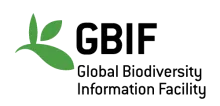The Global Biodiversity Information Facility (GBIF) is an intergovernmental collaboration with the mission to promote and facilitate free and open access to biodiversity data, for use in research and policy.
Through a network of national and thematic 'nodes', coordinated from a secretariat based in Copenhagen, Denmark, GBIF provides a human and technical infrastructure enabling publication of and access to large volumes of data gathered over centuries about the Earth's species.
By promoting common data standards capturing the essential elements to describe the occurrence of species in space and time, GBIF integrates data from widely-varying sources including museum and herbarium specimens, historic literature, ongoing wildlife monitoring programmes and citizens' observations. All records are freely available to consult and download from the global platform, and through a range of national and thematic portals developed by GBIF's partners.
Priorities as a partner of the Global Partnership for Sustainable Development Data
GBIF commits to provide access to all available data on where species have been collected or observed over time, shared under an open licence, to support achievement of the Sustainable Development Goals (SDGs). It offers practical guidance on setting up national networks of data-holding institutions, as well as freely-available tools to share such data and make it available for re-use.
GBIF commits to demonstrate the value of shared biodiversity data in making progress towards SDG 2 (zero hunger), SDG 3 (good health and well-being), SDG 13 (climate action), SDG 14 (life below water), and SDG 15 (life on land), as well as contributions towards all other SDGs.
